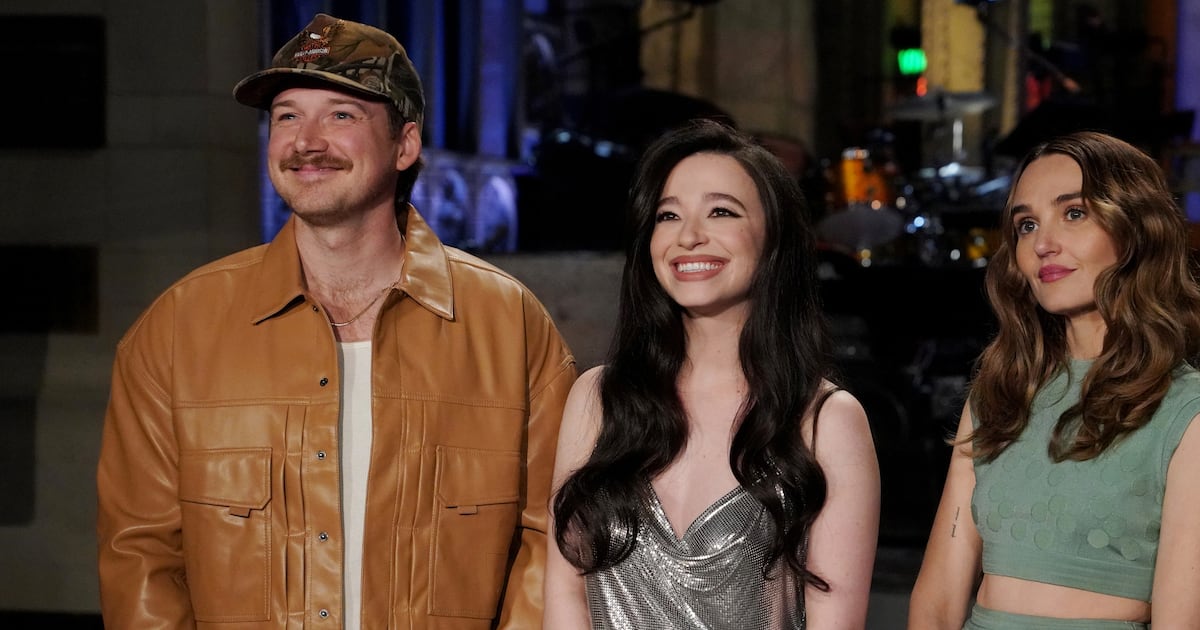In the opening scene of Past Lives, two patrons at a bar gossip off-screen about a trio of strangers they see sitting across the room. One woman sits, smiley and chipper, as she chats with a man, who is equally enthused about the conversation. Next to them is a dour-looking man, who’s left out of the chat. The people watchers guess that the two chatty folks are perhaps brother and sister, seeing as they’re both Korean, and the other (white) man is her husband. Perhaps they are all friends, and none of them is dating one other. Maybe the white man is the American tour guide of the two Korean tourists.
Either way, the onlookers fixate on the woman. She’s at the center, after all, which thrusts us viewers to also hypothesize about her relationship to these men. Then, as the two unseen narrators quiet down, she looks right at us—the audience. She stares into the camera. That woman is Nora, played by Greta Lee. That moment, in which Nora peers into our souls and invites us into her life-affecting story, is otherworldly yet uncomplicated, loud yet quiet. But Lee says it was harder to film than it looks.
“The guys had to put up with me kicking and screaming underneath the bar, just freaking out, because I felt like I wasn’t getting it in the way that I wanted,” Lee says over Zoom, the perfect medium to chat about a movie that spends a quarter of its time on characters’ Skype calls. The emotion that director Celine Song suggested her look convey wasn’t helpful. “Celine was like, ‘It’s a cosmic joke! Tell a cosmic joke with your eyes.’ Like, gahhh! I don’t know how to do that.”
How hard can telling a “cosmic joke” only through eye contact really be? The “cosmic” part of it is key—an entire lifetime of moments has led her to what she’s feeling now. Lee had to build Nora up to this moment by falling in love several times with the two men in this shot. First, at age 12, she had a crush on Hae Sung (Teo Yoo), a friend she met in South Korea before her family immigrated to America. Then, at age 24, Nora caught feelings for Hae Sung again, after reconnecting with him via several Skype calls across the globe. Now, at 36, Nora is married to Arthur (John Magaro), the nice fellow she met at a dreamy summer writing residency, somewhere in the pillowy forest landscape of Montauk.
Just as telling a joke with your eyes isn’t as easy as just staring into a camera for a few seconds, falling in love on camera isn’t as simple as showing up to set, hearing the word “action,” and acting out the yearning. Lee compares this challenge to playing a character that’s dying: “Your body doesn’t know. Your brain knows what’s happening, and what’s fake, and what’s not. Sometimes, the act of engineering certain feelings,” Lee says, “is physical.”

Love is one of those visceral feelings, and it rears its nasty, soul-crushing, yet beautiful head over and over again in Past Lives—not just as a love for other people, but as a sense of longing for the past versions of ourselves.
Lee chatted with The Daily Beast’s Obsessed about the “no touching” rule implemented on set to increase chemistry between the actors, diving into Song’s mind to portray her past, and whether Nora and Hae Sung ever see each other again after Past Lives’ credits roll.
The film opens with a scene at a bar, where a pair of characters gossip about Nora and the men she’s with. We return to the bar later in the movie, to hear Nora’s conversation. Was that first sequence filmed separately from the rest of those moments in the bar?
If memory serves, we shot everything that takes place in the speakeasy bar over two days. I do remember how hard that opening was. I was really humbled by the experience of filming that scene. Just that look [toward the camera]—I put a lot of pressure on myself, in terms of understanding everything we wanted from that look. That look is the invitation to the audience to come join us on this ride. You have no idea who we are, but you’d like to know, so let me tell you.
It was so fully loaded and, technically, it was a long-lens—without getting incredibly boring about it, [filming] it felt like ballistics. I had to throw this look and aim it at a camera that was far, but have it feel intimate and knowing and specific. The timing of it, the facial expression—it was really hard.
On that same technical note, was it hard to shoot those conversations with Hae Sung over Skype?
Going into it, we had some doubts. It’s so hard to engineer connection over the distance of screens. The mechanics of what that was going to be, how we were going to shoot it—they made it intentionally and authentically shitty. It was true to what Skype was back then [in the early 2010s, when the scene was set]. Then, [we had to] create the challenge of establishing the two of them falling in love over Skype. Which happens! It’s real. People have that experience in long-distance relationships. That was intensely challenging, but ultimately, gratifying to do.
Now you’re used to it, so we can meet over Zoom with no issues.
Now I’m a pro! I feel instantly connected to you over Zoom.
Your character has to fall in love so, so many times in this movie. Falling in love is often embarrassing! It’s soul-crushing! Your acting is so real and raw—was filming Nora’s emotional journey a vulnerable experience?
Actually falling in love is hyper-humiliating and cringey. Falling in love, like really falling in love—it’s a full-body experience, no matter who you are. We were all taking that to task, taking really seriously how to convey that.
Celine asked Teo and I not to make physical contact [during filming] before we hug in the movie. Initially, I thought that was so silly. I was like, “Who cares?” But it was an interesting exercise, and I’m so glad, because it created this pressure and it created this attention to: How do you physicalize longing and connection? Celine was amazing in terms of thinking about that, the mechanics of how to engineer pretend love.
How did that “no touching” rule affect your performance?
Understanding that there is a certain physicality—like, certain people bring out certain things. The whole movie is about, on some level, how certain people in your life can serve as a hologram to certain parts of you. We were really specific in terms of what body language is like, making them distinct between Nora and Arthur, Nora and Hae Sung, and also over time. There’s a youthfulness that happens, [as opposed to] a guarded, protected [adulthood]. All of that was taken into account.

I love every scene in this film, but one that has stuck with me is the sequence where Nora meets Arthur at the playwrights’ residency. The place they’re staying feels like summer camp. How did you capture that tone, which is so different from the essence of Nora and Hae Sung’s relationship?
I was using my imagination to think about—I feel like this is relatable—when you’re not looking for love, often that’s when things happen. She closes a door and proceeds. She moves on with her life and is barrelling forth, in terms of what she wants. In that moment, she meets Arthur. It [involved] imagining times in my life where the primary love was not a person, [but rather] an experience or a craft, like summers spent at the Williamstown Theatre Festival, in the outdoors, getting swept up for art. [I had to use] my imagination to see what that could be for Nora at that point in her life, in this surprise encounter with Arthur, who becomes her husband kind of unexpectedly.
This movie is somewhat autobiographical for Celine, who went through a similar experience to Nora. What was it like to dig into her mind and, to a certain extent, play her?
It was a joy, honestly. She was incredible. I’ve never met anyone like her. I was looking to her to channel Nora’s own assuredness and steadiness and knowingness. These are essential qualities of Celine, our brilliant writer-director. It’s a huge responsibility to portray a real person—that person being the writer-director! She gave so much ownership and made it clear that it’s autobiographical, but at a certain point, it’s also not. [She handed] over the character. I’m so grateful that she did that in that way, and it didn’t feel like I was trying to replicate her experience, because it was a totally new story that we were telling.
How do you read Nora’s final cry, at the end of the film? Is Nora feeling overwhelmed by her past coming back to her, or is it a farewell to her younger years?
She’s saying goodbye to her childhood self and the life that could’ve been. She’s saying goodbye to that part of her identity. That goes beyond a racial identity. [It’s] that piece of her soul. From the beginning, Celine was really betting on using restraint, to have this specific emotional arc that pays off at the end. No pressure or anything! [Laughs] But that’s what I mean by the trust and that ownership—she gave me full license.
It sounds weird, but I don’t think I knew what was going to come out. It’s scripted: “She cries.” But I didn’t know how that was going to happen or what it was going to look like or feel like. I remember the first take we did, John was visibly shocked, in a way that made me scared. I was like, “Oh, I made the wrong choice. Is it too much?” He was taken aback. Not in some sort of judgey way, but it did feel like something bigger than me, what was coming out. It was the full expression of what a moment like that could be for someone, to have to say that kind of goodbye.
Do you think Nora and Hae Sung ever see each other again?
I don’t think so. I understand the impulse and the desire of “Team Hae Sung” and “Team Arthur,” like, “Who is she going to choose?” We’ve made jokes of, “Let’s make it a series! Let’s follow up with them later.” But the truth is that it is final. This is goodbye. It has to be that way. That’s what makes it so devastating. It’s the end, for them.






